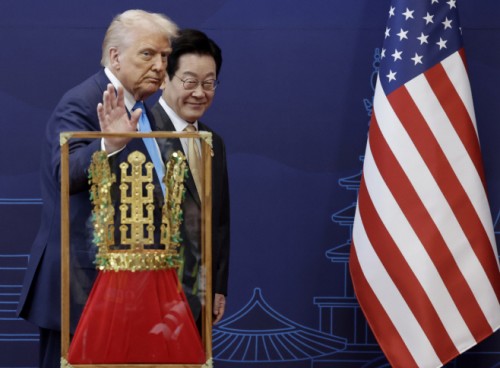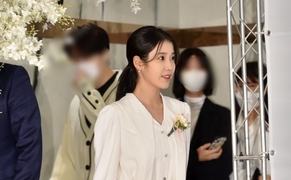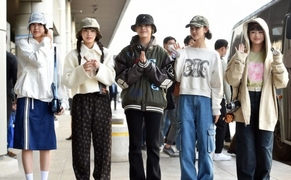 |
| President Lee Jae-myung and U.S. President Donald Trump walk past a replica of the Silla-era gold crown from Cheonmachong during a tour of the Gyeongju National Museum on October 29. / Source: Yonhap News |
President Lee Jae-myung achieved what officials are calling a “triple diplomatic success” at this year’s APEC Summit in Gyeongju, South Korea—concluding a long-stalled tariff negotiation with the United States, securing Washington’s consent for Korea’s nuclear-powered submarine program, and restoring diplomatic ties with China after nearly a decade of chill.
The Gyeongju summit, hailed as a “major diplomatic milestone” for the Lee administration, showcased the president’s leadership in steering multiple high-stakes bilateral meetings on the sidelines of APEC, including talks with U.S. President Donald Trump, Chinese President Xi Jinping, and Japan’s new Prime Minister Sanae Takaichi.
The breakthrough on tariffs—one of the thorniest issues in Korea-U.S. trade relations—was seen as a significant win. Equally notable was Washington’s agreement to cooperate on Korea’s long-sought nuclear-powered submarine project, a goal pursued by several administrations.
In his meeting with Xi, President Lee reaffirmed both sides’ commitment to fully normalize Seoul–Beijing relations, marking the first substantial thaw since 2016. During his discussion with Takaichi, Lee also reconfirmed the pledge made with former Japanese Prime Minister Shigeru Ishiba to resume “shuttle diplomacy” between the two countries.
Lee further deepened South Korea’s global technology partnerships by meeting Nvidia CEO Jensen Huang, securing a supply of 260,000 GPUs and forming what Seoul described as an “AI alliance.” The government also attracted $9 billion in investment commitments from major global firms, including Amazon Web Services (AWS), turning APEC into what officials called a “platform for practical diplomacy.”
At the main APEC session, President Lee led the adoption of the Gyeongju Declaration, reaffirming regional cooperation amid disputes over language related to “free trade.” Despite U.S. objections to that phrase, diplomats hailed the declaration’s adoption as a key achievement.
Lee also spearheaded the APEC AI Initiative—the first collective statement on artificial intelligence in the forum’s history—positioning South Korea as a leading voice in the global AI agenda and advancing its goal of joining the “top three AI powers.”
Throughout APEC, President Lee held bilateral meetings with leaders from 13 countries, focusing on expanding opportunities for Korean companies abroad. His emphasis on technology and competitiveness underscored the administration’s principle of “pragmatic diplomacy centered on national interest.”
Observers noted that Lee’s steady and incident-free management of one of the world’s largest diplomatic gatherings left a strong impression among the 21 APEC member states and strengthened his standing on the international stage.
Most Read
-
1
-
2
-
3
-
4
-
5
-
6
-
7





















